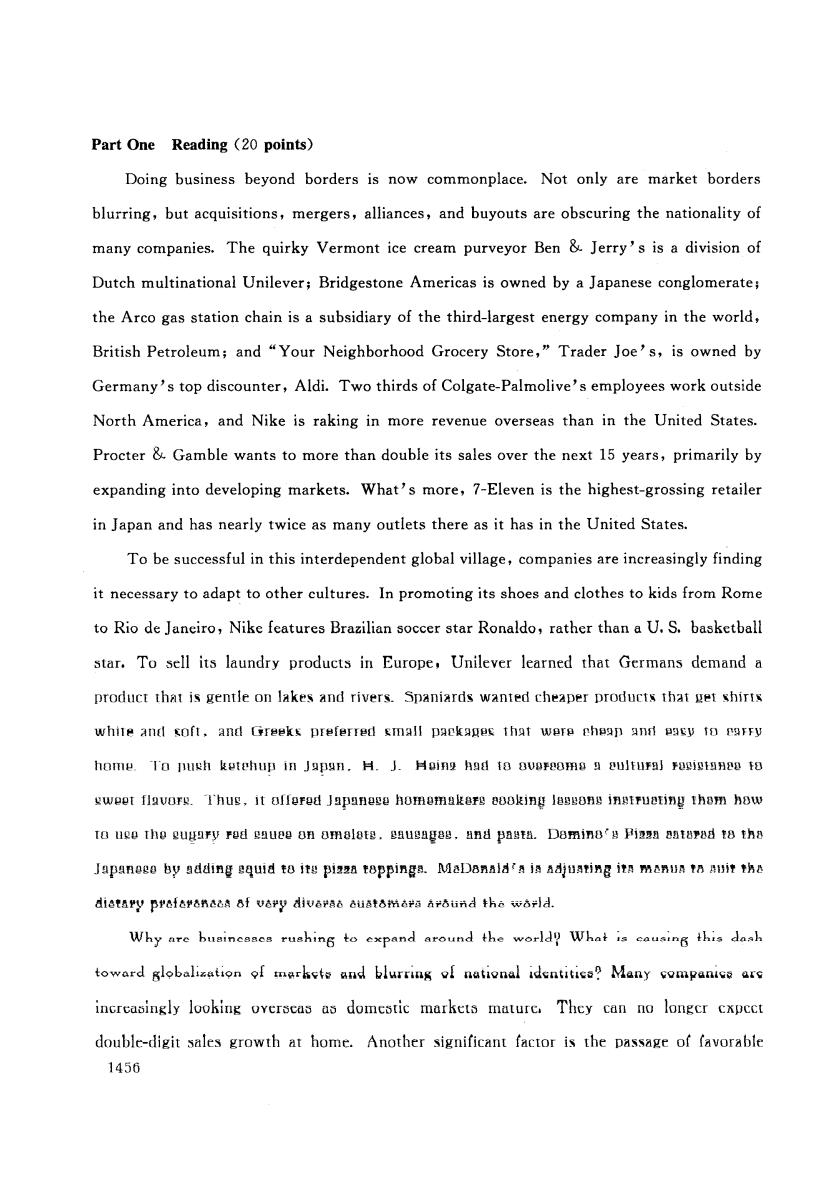正在加载图片...

Part One Reading (20 points) Doing business beyond borders is now commonplace.Not only are market borders blurring,but acquisitions,mergers,alliances,and buyouts are obscuring the nationality of many companies.The quirky Vermont ice cream purveyor Ben Jerry's is a division of Dutch multinational Unilever;Bridgestone Americas is owned by a Japanese conglomerate; the Arco gas station chain is a subsidiary of the third-largest energy company in the world, British Petroleum;and "Your Neighborhood Grocery Store,"Trader Joe's,is owned by Germany's top discounter,Aldi.Two thirds of Colgate-Palmolive's employees work outside North America,and Nike is raking in more revenue overseas than in the United States. Procter Gamble wants to more than double its sales over the next 15 years,primarily by expanding into developing markets.What's more,7-Eleven is the highest-grossing retailer in Japan and has nearly twice as many outlets there as it has in the United States. To be successful in this interdependent global village,companies are increasingly finding it necessary to adapt to other cultures.In promoting its shoes and clothes to kids from Rome to Rio de Janeiro,Nike features Brazilian soccer star Ronaldo,rather than a U.S.basketball star.To sell its laundry products in Europe,Unilever learned that Germans demand a product that is gentle on lakes and rivers.Spaniards wanted cheaper products that get shirts white and soft.and Greeks preferred small packages that were cheap gnd eaty to rarry home.To nugh ketehup in Japan.H.J.Hoing had ta avoreama n gultural rogigianen t8 gweot flavorg.Thus,it affered Japanese homomakarg aooking lassong ingtruating tham how I0 ueo tho gugary ro日euee8n8用8l8t8.盟ueag8s,Hn&pnE.D8minB慧Pj鬥22朗t8P8dt8th8 J99 nogo by9ddn度equid8 ite pi2 aa tapping段a.Ma&D8nad'a is adjuating itn m△nua ta auit t房& di8 tary pre8f销cA8fU态ydiU6#a68uatδ指a护aar6i片dh。dld. Why are buaincsses ruahing to expand around the worldo What is cousing this danh toward globalization of markets and blurring of national identitics?Many companice are increasingly looking overscas as domestic markets maturc.They can no longcr cxpcct double-digit sales growth at home.Another significant factor is the passage of favorable 1456Part One Reading (20 points) Doing business beyond borders is now commonplace. Not only are market borders blurring , but acquisitions, mergers, alliances, and buyouts are obscuring the nationality of many companies. The quirky Vermont ice cream purveyor Ben & Jerry' s is a division of Dutch multinational Unilever; Bridgestone Americas is owned by a Japanese conglomerate; the Arco gas station chain is a subsidiary of the third-largest energy company in the world. British Petroleum; and "Your Neighborhood Grocery Store ," Trader Joe' s, is owned by Germany' s top discounter, Aldi. Two thirds of Colgate-Palmolive' s employees work outside North America , and Nike is raking in more revenue overseas than in the United States. Procter & Gamble wants to more than double its sales over the next 15 years, primarily by expanding into developing markets. What' s more , 7-Eleven is the highest-grossing retailer in Japan and has nearly twice as many outlets there as it has in the United States. To be successful in this interdependent global village , companies are increasingly finding it necessary to adapt to other cultures. In promoting its shoes and clothes to kids from Rome to Rio de ] uneiro , Nike feature Bruúliun soccer star Ronaldo , rather thun u U. S. busketbull star. To sell its laundry products in Europe I Unilever learned that Gerrnans dernand a product thíll is Rentle on lílkes ílnct rivt'fs. 5p;mi;ud直飞Mitnted l" itP products th;H !Jl't shirt whitl" ;m(1 ~Ofl. ;md (主 兽兽 10; prl"fl"H I"d ~rn >l ll >l[, \(lH!ê~ th>lt WêHI f'hê>lP '.Im1 '.I !<Y to f''.I Hy hOI1l!'. To llll\.lh lUH{lhup ln 旦旦_ 1"1. J. ÞlIlln2 H!HI tß OUIH'!'O !'ulfuJ'!lJ Nl!l í!H 旦到 Nl fO \.lWIl!H fl !Jum!L ThU!l. It OfflUllfl J!lp!lnQ!lQ hom !l民1'!l !l !)o!<ln !l!l!l 旦旦lH!1 UU8白白雪白11m Þmw to U\lll Hw !lUjJ!ll'y I'llfl !l!lU!'1l on om lß钮. !l!l !l且 ~ß旦,旦fui p!lllt!l. D8mifm? Pi~l!.!l 8!ltßl'Bà 白白哥 !l旦吕 吕l3 !J(jàifl~ llquiå to it!! pi l!l!!l凹 ppifl Ð'!l. MðDð贯主 là r !l i!\ aàju!lt'iflB it!l mðfllJl\ M 1mi' 站在 åi 提主t'~ t' t;t't;I\ ~M ôf 时l'}' t!i vê l'亘在拍昌白盲目 êrs nrðünd rl .1. 飞'l hy "..c bus;ncsscs ..ush;n5 ~o cxpAnd 1'凸 u...d the vvorld'l Wh"t '5 caU S1 tJ比'$ d"",h tovvard Sloba.b ,,,ti9n 9f tn íO\ b, çt 面画画 bl l.\ ni l1再♀ l1 ~ti l. l idçl1titi\a'l? M~l1 Y \J ωFioI.副\i;;l iOI."盲 incrt:âtìingly lookin~ overm::as aô dome吕tÌ rnarketô rnaturc. Thcy call nü lOlll':cr CKpcct double叫1i git :"\llles growth at horne. Another siRniíicant factor is the passai!e oÍ Íl\vorílble 1455